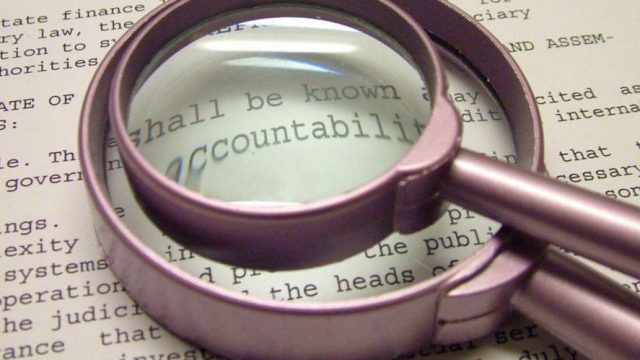Why Not Require Full Campaign Disclosure From North Dakota Politicians?

“A new North Dakota State University study argues North Dakota’s campaign finance laws have a ‘blind spot’ that could be hindering the transparency of its elections,” reports John Hageman for the Fargo Forum today. “North Dakota law only requires campaign committees to report the names and organizations that have contributed more than $200, and not for those giving $200 or less. The committees only have to report the aggregate total of those contributions, according to the study from the Upper Midwest Center on Public Policy, led by Managing Director Nick Bauroth.”
If that’s the only “blind spot” the NDSU researchers could find in North Dakota’s campaign finance laws they weren’t looking very hard.
[mks_pullquote align=”right” width=”300″ size=”24″ bg_color=”#000000″ txt_color=”#ffffff”]The solution seems simple to me. Require that candidate campaigns and ballot initiative committees report every contribution, and every expenditure, once a week during the entire election cycle.[/mks_pullquote]
In addition to the loophole for sub-$200 contributions legislative candidates have far fewer reporting requirements than statewide candidates, and neither legislative nor statewide candidates have to report campaign expenditures. And because there’s no reporting of campaign expenditures, and no prohibition on candidates spending campaign dollars on themselves, our politicians are free to use their campaign contributions on anything from actual campaign expenses to, say, buying tickets for themselves at a Vikings game.
Ballot initiative committees have even fewer reporting requirements than the politicians. Groups looking to legislative directly at the ballot box only have to publish a full report of their finances twice a year. Once at the end of the year, and another 32 days before election day. Starting 39 days before election day committees are required to make a report within 48 hours for any single contribution over $500, but they don’t have to report anything under $500 until the end of the year. And nothing under $100 needs to be reported at all outside of a gross dollar amount.
This means that these committees can gather signatures and put their issues on the ballot before citizens get even a limited glimpse at who, specifically, is financing the operation.
And just like with the politicians there are zero reporting requirements these groups must meet for expenditures.
So how do we fix these problems? The solution seems simple to me. Require that candidate campaigns and ballot initiative committees report every contribution, and every expenditure, once a week during the entire election cycle.
Some might say that this is excessive, and that it puts too much burden on the campaigns. While that may have been true in another era when campaign bookkeeping was done on paper, it shouldn’t be a hassle in the digital age. The reports needn’t be any more technically complex than a spreadsheet to be uploaded to the state’s online disclosure database at regular intervals.
This is something we can do to make politics in North Dakota a lot more transparent. The only question is whether or not we will do it.




